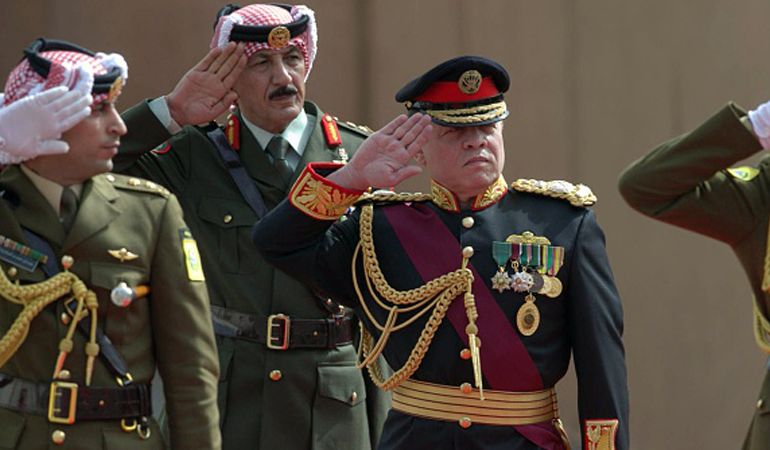Jordan King Abdullah set to consolidate executive power
Proposed constitutional amendments give King Abdullah II total control over military, judiciary and security agencies.

Jordan’s King Abdullah II is set to consolidate his powers through constitutional amendments that would give him sole constitutional control in areas of security, defence, foreign policy and the judiciary.
The move, which triggered controversy in the past few days, began earlier this week with the government of Prime Minister Abdullah Ensour submitting a bill to Parliament, requesting approval of several constitutional amendments.
The proposed changes will grant the king absolute powers to appoint his crown prince, deputy king, the chief and members of the constitutional court and the head of the paramilitary police force.
They also include lifting the ban on Jordanian citizens with duel nationalities from holding public office.
The Jordanian monarchy system is going through major changes and is taking a new form.
Although Jordan is officially a constitutional monarchy, where the king enjoys wide powers granted to him by the constitution, all of the current major appointments and decisions require the recommendations and the signatures of the prime minister and certain ministers.
With the constitutional amendments, the king would no longer need the government to recommend nominees, or the signature of ministers or the prime minister.
Jordanian journalist Fahd al-Khitan told Al Jazeera that the previous amendments, along with the proposed new ones have in effect liberalised the Jordanian constitution and will pave the way for parliamentary governments in the future.
“King Abdullah’s long-term objective is to strengthen and insulate the monarchy by making it the guarantor of unity and stability of the country and lead it through a long transitional period, eventually leading to the establishment of a parliamentary government,” al-Khitan said.
Opponents, however, consider the move a rollback of gains and reforms that took place during the Arab Springs in 2011, when the king promised more reforms that would eventually limit his powers, not increase it.
READ MORE: Jordan King given further exclusive powers
“The king has always enjoyed wide powers and often ruled directly, but retained a veneer of separation of powers and constitutional formalities that gave the prime minister official advisory and executive roles,” attorney Ahmad al Najdawi told Al Jazeera.
“The new proposed changes would remove any veneer of separation of powers between the king and the executive and judicial branches.”
“The king might expose himself to public criticism and discontent in case his choices commit mistakes or were involved in corruption
Former top aide to Prime Minister Abdullah Ensour Husam Abdallat pointed out that “the drive to remove that veneer of formalities of government involvement in appointing the leaders of certain braches of power, is dangerous, even to the king”.
“The king might expose himself to public criticism and discontent in case his choices commit mistakes or were involved in corruption, as was the case with two previous heads of the General Intelligence Department,” he told Al Jazeera.
‘Total nonsense’
Mohamad al-Hejuj, a member of parliament, said the opposition to the amendments “is total nonsense”, arguing that the amendments are within the spirit of the constitution because the king is the head of all three branches of power, the executive, the legislative and the judiciary.
“This is why I support the king here,” he told Al Jazeera from Amman.
“The king is well within his constitutional right to drop the formalities of having the government recommend to him high-level appointees, and retain his constitutional right to do that without the government involvement,” Hejuj added.
The new amendments come on the heel of two previous amendments.
The first, which came in the aftermath of the Arab Spring in 2011, limited powers of the king to dissolve and reconvene parliament.
The second, issued last year, granting the king the power to individually appoint the head of military’s chief of staff and the head of the General Intelligence Department without the recommendation from the Council of Ministers and the prime minister.
Follow Ali Younes on twitter @ali_reports